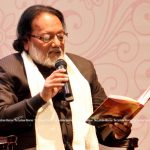The joy of diving into the female heart
Leaving their men at home, women from different walks of life met at the Press Club recently, to enjoy shaam-e Afsana, or an evening of tales that revolved around forgetting, forgiving and the depths of a female heart.
Five female tale twisters including Masroor Jahan, the Dame Barbara Cartland of Urdu writing made the evening memorable. It maybe recalled that Dame Barbara was one of the world’s most successful authors, with estimated worldwide sales of one billion copies in 36 languages. Her romantic novels, many on the theme of the innocent young lady swept off her feet by a dashing young suitor, brought joy to readers all over the world.
Similarly Masroor Jahan enjoys a huge following of fans. Her Jab gily mit gaey is one of the most popular social/ romantic Urdu novels to be first published in a monthly Urdu Digest. Faisla is her first novel from 1962 but it was Taabaan published in 1970 that made her writing wanted by more and more readers. Ever since Masroor Jahan has published 50 novels and over 500 short stories.
She continues to write and to be translated into English, Hindi, Punjabi, Marathi, Kannada, Tamil and Telugu. Her latest collection of short stories Kahan Ho Tum appeared in 2012 and sold like books published by Mills & Boon, the British imprint of fiction for women since the 1930s.
Her story of the day had revolved around the day to day frustrations of a newly wed bride with her mother in law. This young working woman dreams of a home of her own and cant wait to bring up her nuclear family far away from her mother in law.
However pregnancy makes her realise that it is unfair to separate her husband from his mother. The protagonist emerges even more empowered as she chooses not to turn her back on what is good in the traditional way of life. Once she makes up her mind, she has no problem giving up her dream of a home of her own and to brace herself to face all challenges that come with living within a joint family.

Alive and kicking
Parveen Talha, former bureaucrat and author observed that all the tales woven by women that evening is prove that the Urdu language is alive and kicking.
“After partition of the Indian sub continent in 1947, the Urdu language seemed to have become a whisper but today its voice is loud and clear,” said Parveen whose short stories in English titled Fidae Lucknow are mostly about ordinary citizens of the city and being translated into Urdu by former principal of Karamat Husain Muslim Girls PG College Sabiha Anwar, herself a well known writer.
Sabiha’s short story called Dil ka bhed, or secrets of the heart is about a woman so engrossed in her own love and loss that she is unable to appreciate the joys that the present has to offer her until realisation dawns upon her that happiness is here and now.
Well known writer and poet Ayesha Siddiqui read Ujli subah ka anjam, or the consequences of a bright morning, her story about a woman who wakes up fresh and sparkling each morning but as the day progresses she wilts by the hour. The fate of the protagonist and the stamping out of her aspirations and dreams by society are symbolic also of the way nature is soiled by human beings who pollute without care, making life and the environment more filthy each day.
Well known poet and assistant editor, Imkaan, leading Urdu magazine Salma Hijab’s amusing tale was called M for Maggi.
Ghazaal Zaigham, an official in the information department writes fluently in the charming dialects of Avadh. She read Phulwa, penned in the same rustic language spoken by people from the many suburbs surrounding Lucknow.
Organised by Bazme Urdu, an organisation that has been nursing the Urdu language since 1972 and was founded by the late Zeba Salahuddin. Over the years the organisation has opened schools for young children, hosted adult literacy classes in Urdu for working women, encouraged Urdu learning classes for students of English medium schools like La Martinere Girls and head hunted and given patronage to aspiring women writers and poets in the Urdu language, Shaihla Siddiq Umar. treasurer and vice president, Bazm-e- Urdu told The Lucknow Observer.




